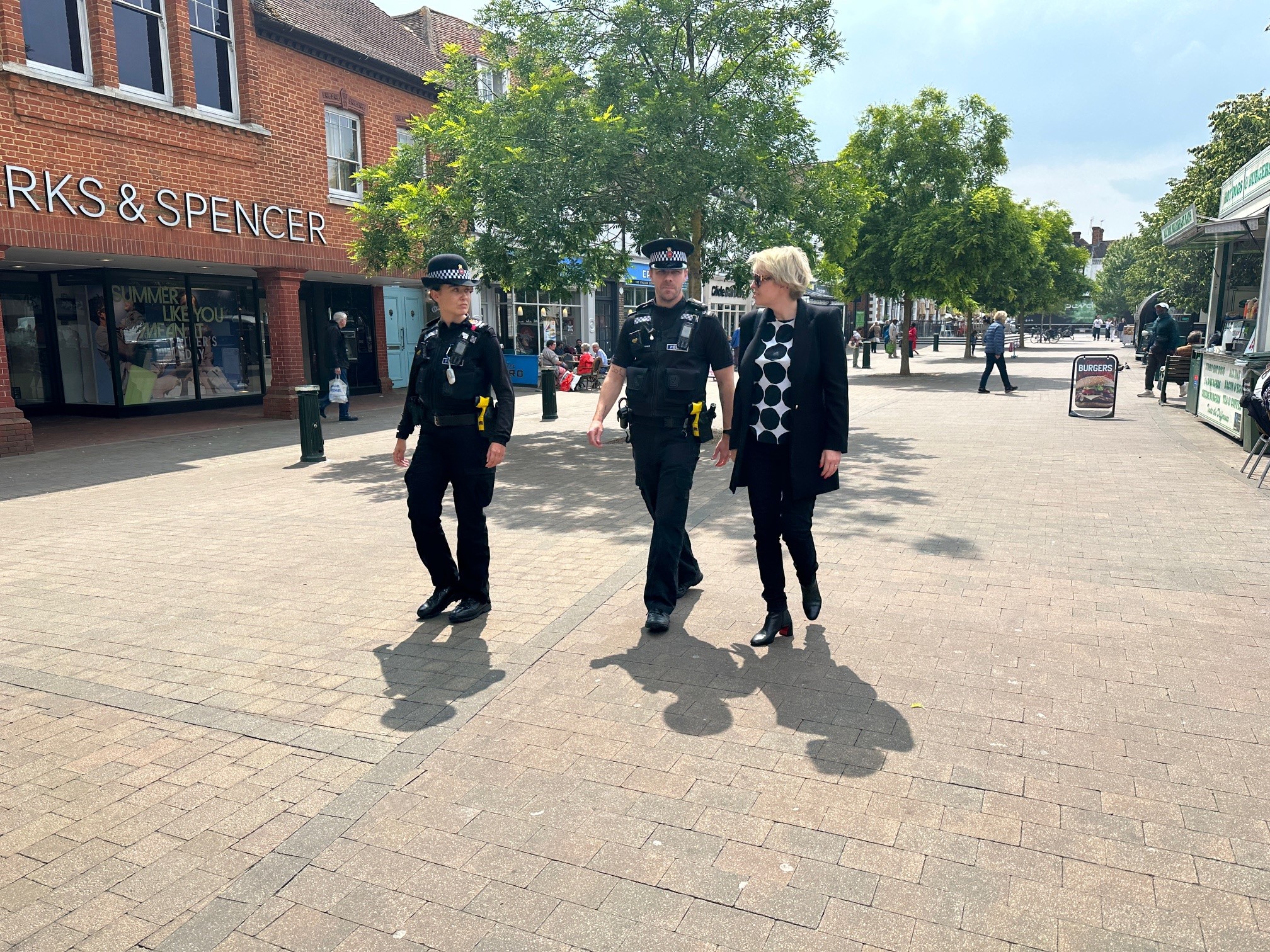The effective management of complaints by Surrey Police is vital to improving policing services in Surrey. Your Commissioner strongly believes in maintaining high standards of policing across the county.
Please see below how the Commissioner oversees the management of complaints by Surrey Police. To ease understanding, we have taken the headings directly from the Specified Information (Amendment) Order 2021.
How the Force is measuring complainant satisfaction
The force has created a bespoke performance product (Power-Bi) that captures complaint and misconduct data. This data is scrutinised by the Force regularly, ensuring performance remains a high priority. This data is also available to the Commissioner who meets on a quarterly basis with the Head of Professional Services Department (PSD), ensuring that the management of complaints in a timely and proportionate manner is maintained. In addition, to scrutinise and receive updates on performance, our Head of Complaints personally meets with PSD on a monthly basis.
PSD focus heavily on complaint satisfaction by making sure any initial contact with a complainant is both timely and proportionate. Quarterly IOPC data indicates that Surrey Police is performing really well in this area. It is both better than Most Similar Forces (MSF) and National Forces when it comes to initial contact with and the logging of complaints.
Progress updates on implementing relevant recommendations made by the IOPC and/or HMICFRS in relation to complaints handling, or where recommendations were not accepted an explanation as to why
IOPC Recommendations
There is a requirement for Chief officers and local policing bodies to publish recommendations made to them and their response on their websites in a way that is clear and easy for members of the public to find. There is currently one IOPC learning recommendation for Surrey Police. You can read our response here.
HMICFRS Recommendations
His Majesty’s Inspectorate of Constabulary and Fire Rescue and Fire Services (HMICFRS) routinely monitors progress against recommendations that they make to police forces in their inspection reports. The graphic below shows progress police forces have made against recommendations made to them in the 2018/19 Integrated PEEL Assessments and PEEL Assessments 2021/22. Recommendations that have been restated in more recent inspection reports are shown as superseded. HMICFRS will be adding more data to the table in future updates.
See all Surrey updates in relation to HMICFRS recommendations.
Super-complaints
A super-complaint is a complaint made by a designated body that “a feature, or combination of features, of policing in England and Wales by one or more than one police force is, or appears to be, significantly harming the interests of the public.” (Section 29A, Police Reform Act 2002).
See the full responses to super-complaints from both Surrey Police and the Commissioner.
Summary of any mechanisms put in place to identify and act on themes or trends in complaints
Monthly meetings exist between our Head of Complaints and PSD. Our office also has a Complaints Review Manager who logs learning from statutory reviews requested under Schedule 3 of the Police Reform Act 2002 and shares this with PSD. Moreover, our Contact and Correspondence Officer records all contacts from residents and captures data to provide statistical insight into common themes and emerging trends so that these can shared with the Force in a timely manner.
The Head of Complaints also attends the Force Organisational Learning Board, together with many other force-wide meetings so that wider learning and other matters can be raised. Our office also works with the force to secure wider force learning through force-wide communications, training days and CPD events. The Commissioner is directly briefed on all these matters on regular basis.
Summary of systems in place to monitor and improve performance in the timeliness of complaints handling
Monthly meetings between our Head of Complaints, the Complaints Review Manager, Contact and Correspondence Officer and the Head of PSD occur to discuss performance, trends, and timeliness. Formal quarterly meetings with PSD allow the Commissioner to receive updates on timeliness aswel as other areas in relation to complaint handling. Our Head of Complaints will also specifically monitor those cases taking longer than 12 months to investigate and will feedback to PSD any concerns regarding timeliness etc.
The number of written communications issued by the force under regulation 13 of the Police (Complaints and Misconduct) Regulations 2020 where an investigation has not been completed within a “relevant period”
Annual data on the number of investigations carried out and the time taken to complete them can be viewed on our dedicated Data Hub.
The Hub also contains details of notices under under regulation 13 of the Police (Complaints and Misconduct) Regulations 2020.
Quality assurance mechanisms in place to monitor and improve the quality of its responses to complaints
Many meetings exist to monitor the timeliness, quality and overall complaint performance by the force. The Office of the Commissioner log all contact with our office from members of the public, ensuring that any complaints about the force or its staff are passed to PSD in a timely manner.
The Head of Complaints now has access to the complaints database used by PSD and undertakes regular dip check reviews of those cases that have been investigated and closed by the force. By doing so, the Commissioner will be able to monitor responses and outcomes.
Details of the administrative arrangements the Commissioner has put in place to hold the Chief Constable to account for complaints handling e.g. frequency of meetings and a summary of discussions
Public Performance and Accountability meetings are held with the Chief Constable of Surrey Police three times a year. These meetings are complemented by Resource and Efficiency meetings that are held in private between the Commissioner and Surrey Police. It has been agreed that a dedicated complaints update will be considered at least once every six months as part of this meeting cycle.
Please see our section on Performance and Accountability for more information.
Timeliness of complaint reviews e.g. the average time taken to complete reviews
As a Local Policing Body (LPB), the Office of the Commissioner has recruited a fully trained and appropriately skilled Complaints Review Manager whose sole responsibility is to conduct statutory reviews recorded under Schedule 3 of the Police Reform Act 2002. In this process, the Complaints Review Manager considers whether the handling of the complaint by PSD was reasonable and proportionate.
The Complaints Review Manager is impartial to PSD and is recruited solely by the Commissioner for the purposes of independent reviews.
- View the most recent Timeliness Reports Summary Table
- Data on the number of reviews carried out by our Complaints Review Manager is available here, including the average length taken to complete a review, and comparison to our most similar forces (MSF) and national average.
Quality assurance mechanisms the Commissioner has established to ensure that review decisions are sound and in line with the requirements of the complaint’s legislation and IOPC statutory guidance
All statutory review decisions are formally logged by our office. Moreover, in addition to the complaint itself, results of reviews by the Complaints Review Manager are also sent to the Chief Executive and Head of Complaints for awareness and review. We also provide the IOPC with data on such reviews.
How the Commissioner assesses complainant satisfaction with the way in which they have dealt with complaints
There is no direct measure of complainant satisfaction. However, there are several indirect measures in terms of the information collated and published about performance by the IOPC on their website for Surrey.
The Commissioner also keeps these key areas under review:
- The proportion of dissatisfaction dealt with outside the formal complaints process (outside schedule 3) and which enables prompt action to resolve issues raised by the public and those which then result in a formal complaints process
- The timeliness of contact with the complainant to deal with the complaint
- The quantity of complaints which, when being investigated within the formal complaints process (inside schedule 3), exceed a 12-month investigation time period
- The proportion of complaints where complainants apply for a review. This shows that, for whatever reason, the complainant is not happy with the outcome of the formal process
The other key consideration is the nature of complaints and organisational learning arising which if dealt with effectively, should support public satisfaction with the service delivery in the future.
For Commissioners who operate as a ‘Model 2’ or ‘Model 3’ area: the timeliness of initial complaint handling undertaken by the Commissioner, details of quality assurance mechanisms for decisions made at the initial complaint handling stage and [Model 3 only] the quality of communications with complainants
All local policing bodies have certain duties in relation to the handling of complaints. They can also choose to take on responsibility for certain additional functions that would otherwise sit with the chief officer:
- Model 1 (mandatory): all local policing bodies have responsibility for carrying out reviews where they are the relevant review body
- Model 2 (optional): in addition to the responsibilities under model 1, a local policing body can choose to assume responsibility for making initial contact with complainants, handling complaints outside of Schedule 3 to the Police Reform Act 2002 and recording complaints
- Model 3 (optional): a local policing body that has adopted model 2 can additionally choose to assume responsibility for keeping complainants and interested persons properly informed of the progress of the handling and outcome of their complaint
Local policing bodies do not become the appropriate authority for the complaint under any of the above models. Rather, in the case of models 2 and 3, they perform some of the functions that the chief officer would otherwise carry out as the appropriate authority. In Surrey, your Commissioner operates ‘Model 1’ and is responsible for carrying out reviews under Schedule 3 of the Police Reform Act 2002.
Further information
Learn more about our complaints process or see complaints data about Surrey Police here.
Get in touch using our Contact us page.
Latest News
“It’s what residents want to see”: Surrey’s Safer Streets Summer begins

Busy town centres across Surrey will see a tailored plan of action to tackle criminality and enhance community safety.
“Transformative” strategy to tackle criminality and restore pride sees crime drop in Redhill

The Safer Redhill scheme aims to restore pride in the community and drive out criminality.
Impacted by anti-social behaviour? Here’s why it matters (and where to get support)

One of the key priorities in the Commissioner's Police and Crime Plan is strengthening safe and resilient communities.